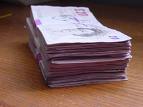Both central banks decided their monetary policy changes today regarding their main interest rates. Both Bank of England and European Central Bank left their interest rates unchanged — 5.50% and 4.00% respectively as the majority of the market experts were predicting. As the decisions were expected, they didn’t gave the speculators any surprise to trade on, but the GBP/USD went volatile immediately after the report went public, first gaining … “Pound Down, Euro Up after Central Banks’ Decisions”
Month: January 2008
Foreign Currency Reserves Up in Japan
Japanese Ministry of Finance released a report today regarding the country’s international exchange reserves and the foreign currency liquidity along with the structure of the overall assets as on the end of December 2007. The value of the total foreign exchange reserves accommodated by the Japan reached $973.36 billion — breaking the record high level again after gaining about $3.18 billion compared with the value at the end of November. The boost in the foreign currency reserves is attributed to the elevated demand … “Foreign Currency Reserves Up in Japan”
Japanese Yen Down Today
Tokyo based massive sale of the Japanese yen spurred the daily drawdown of this Asian currency. Residents preferred to sell the yen opting for the riskier but higher yielding currencies, such as euro, Australian and New Zealand dollar and South african rand (so called carry trade investing). The investors’ confidence for the global financial system’s stability was greatly inspired with the recent advances on the Japanese stock markets following the announcement by the U.S. government … “Japanese Yen Down Today”
Rupee Rises on Capital Inflow
The Indian rupee rose today again, making a fourth bullish day in a row after the national stock index rally attracted the investments of the global funds to into the Indian emerging economy. The rupee was traded at the highest rate against the U.S. dollar in almost ten years. The major catalyst for the rupee’s … “Rupee Rises on Capital Inflow”
Canadian Dollar Doomed to Lose in 2008?
The Canadian dollar showed an unprecedented growth against the U.S. dollar last year. Rallying almost straight from 1.1635 to 0.9905, USD/CAD lost almost 15% in one year and broke two important support levels — psychological barrier of 1 CAD per USD and reaching its lowest value since the floating of the USD/CAD rate — 0.9057. The growth of the Canadian dollar was mainly caused by the more than 50% rally of the oil prices and similar … “Canadian Dollar Doomed to Lose in 2008?”
Rising Chile’s Inflation May Cause Another Rate Hike
Chile’s Consumer Price Index increased unexpectedly last month by more than analysts forecasted, increasing the odds that the Central Bank of Chile will raise the refinancing interest rate on the next week’s meeting to fight the record breaking high inflation. Consumer prices rose 0.5% in December after 0.8% growth in November, the National Statistics Institute‘s … “Rising Chile’s Inflation May Cause Another Rate Hike”
Pound is Recovering on Good PMI Data
The Great Britain pound recovered the part of its recent losses against the euro, the dollar and the yen today after the U.K. services index for December (reported by the Chartered Institute of Purchasing and Supply) unexpectedly rose. Financial market analysts expected the PMI index (services index) to be reported at 51.6 for December, slightly lower than the November’s 51.9, but it has exceeded everyone’s expectations and was reported at 52.4, showing a gain of confidence in the services … “Pound is Recovering on Good PMI Data”
Chinese Yuan at a Highset Rate against Dollar
According to the China Foreign Exchange Trading System, the dollar/yuan central parity rate was set at its record low since the scrap of peg to dollar – 7.2775; down from 7.2996 previous recent record level. Chinese government eliminated the yuan’s peg to the U.S. dollar and bound the national currency to trade-weighted basket of the … “Chinese Yuan at a Highset Rate against Dollar”
Aussie and Kiwi Gain on Higher Yields
Both Australian and the New Zealand dollars gained today on a presumption that the international investors bought Australia’s and New Zealand’s government bonds as their premiums yield more than their U.S. and Japanese counterparts. Yield differentials have been the major advantages of Aussie and kiwi for quite a while now. But yesterday and today the difference between Australian and U.S. two-year government notes reached the highest value in about four years, while New … “Aussie and Kiwi Gain on Higher Yields”








